- Fiber-rich breakfasts your essential guide to staying full and energized
- What is Fiber and Why It Matters
- Oatmeal: The Classic Fiber Powerhouse
- Chia Seeds: Tiny but Mighty
- Whole-Grain Cereals: Crunchy Fiber Fix
- Berries: Sweet and Fiber-Filled
- Fiber-rich breakfasts your essential guide to staying full and energized
- Quick and Delicious Fiber-Packed Breakfast Ideas
- Avocado Toast: A Creamy and Nutritious Start
- Smoothies: A Refreshing Fiber Boost
- Greek Yogurt: A Protein-Packed Partner
- FAQ
- Fiber-Rich Breakfasts FAQs
- 1. What makes breakfast a crucial meal for incorporating fiber?
- 2. How can fiber-rich breakfasts contribute to overall health?
- 3. What are some key fiber-rich breakfast options?
- 4. Can avocado be a part of a fiber-rich breakfast?
- 5. How does fiber help to keep you full and satisfied?
- 6. What role do whole grains play in a fiber-rich breakfast?
- 7. Are smoothies a good option for a fiber-rich breakfast?
- 8. How can fiber-rich breakfasts help with boosting energy levels?
- 9. Can fiber-rich breakfasts aid in weight management?
- Conclusion
Fiber-rich breakfasts your essential guide to staying full and energized
Starting your day with breakfast is important. When you choose a meal with lots of fiber, you’re making a smart choice.
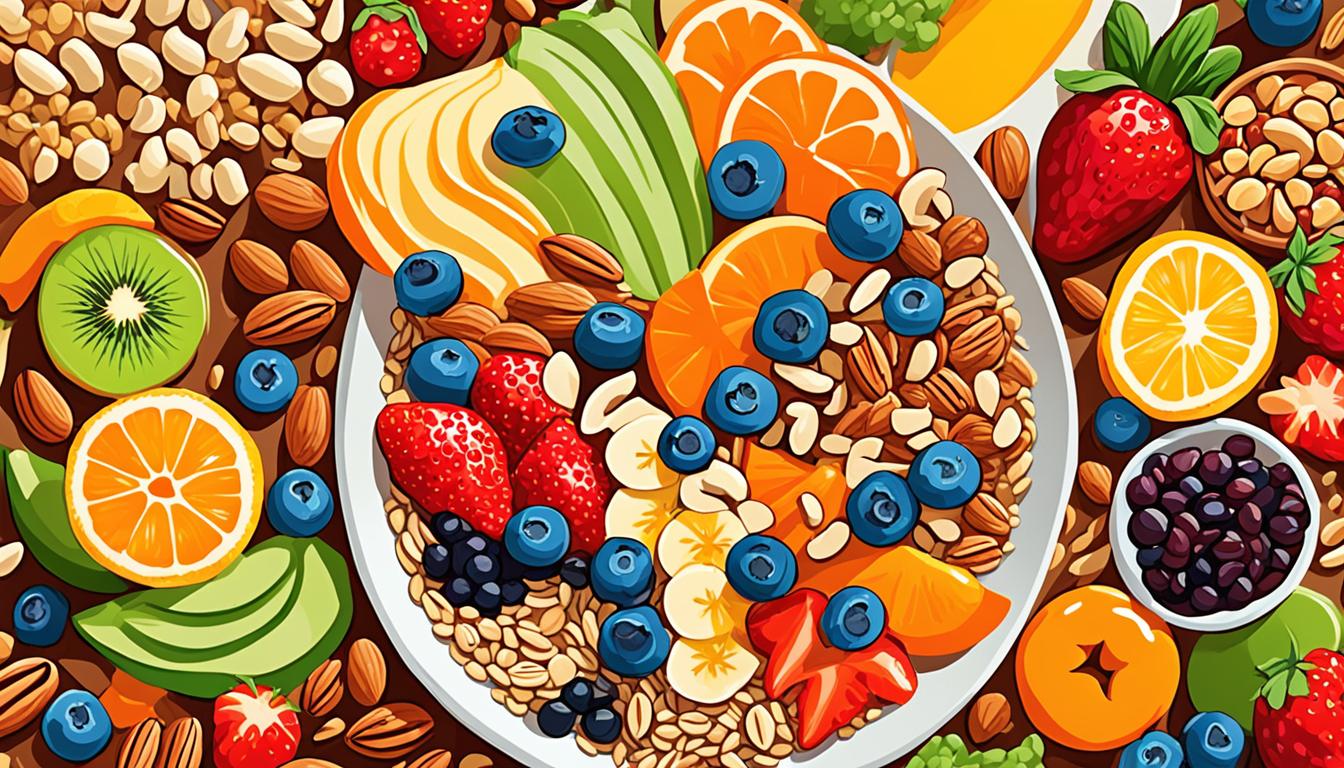
This article is all about awesome breakfasts full of fiber. These meals will keep you full, energize your body, and make your day great. Fiber comes from plants and is not digested by our bodies, but it is very good for our health. Soluble fiber and insoluble fiber both help our bodies in different but important ways. Eating a breakfast that’s rich in fiber is perfect for a healthy morning. It helps with digestion, makes you feel full, and keeps your blood sugar steady.
Key Takeaways
- Fiber is a type of carbohydrate found in plant-based foods that plays a crucial role in digestive health.
- There are two types of fiber – soluble and insoluble – each with unique benefits.
- Oatmeal, chia seeds, whole-grain cereals, and berries are excellent sources of fiber-rich breakfast options.
- Fiber-packed breakfasts can promote digestive health, enhance satiety, and regulate blood sugar.
- Incorporating fiber-rich foods into your morning routine can provide a satisfying and energizing start to the day.
What is Fiber and Why It Matters
Fiber is a special carb in plant foods. Our body doesn’t digest it. It’s key for our health, especially for digestion and managing weight. Knowing the types of fiber helps us choose well for our health.
Types of Fiber
There are two main types of fiber: soluble and insoluble. Soluble fiber helps lower bad cholesterol. Insoluble fiber keeps us from getting constipated. Both are great for our health in different ways.
Benefits of Fiber for Digestive Health
Fiber keeps our digestive system running smoothly. Insoluble fiber makes our stool bigger. It helps food move through our guts, avoiding constipation. Soluble fiber calms our gut and supports good bacteria growth.
Fiber’s Role in Weight Management
Eating foods high in fiber can help manage weight. Fiber makes us feel full. It stops us from eating too much. Also, it keeps our blood sugar levels steady, avoiding sudden tiredness.
Knowing about fiber types and their good points lets us choose wisely. Adding fiber-rich foods to breakfast sets a healthy tone for the day. It’s good for our whole health.
Oatmeal: The Classic Fiber Powerhouse
Oatmeal is a breakfast classic for a reason. It’s bursting with fiber and good nutrients. Eating oatmeal can lower bad cholesterol. Plus, it’s tasty when you add fruits, nuts, or honey.
Soluble Fiber in Oatmeal
Rolled oats have a special kind of fiber called beta-glucan. It helps your heart by reducing bad cholesterol. This fiber also makes sure you stay regular and helps prevent constipation.
Oatmeal’s Versatility
Oats give you carbs, protein, and good fats for energy. They keep you going all morning. You can eat them as oatmeal, in smoothies, pancakes, or muffins.
Sustained Energy from Oatmeal
Rolled oats are also a good plant-based protein. They help your muscles, immune system, and health. Oatmeal’s energy lasts, making it perfect for breakfast.
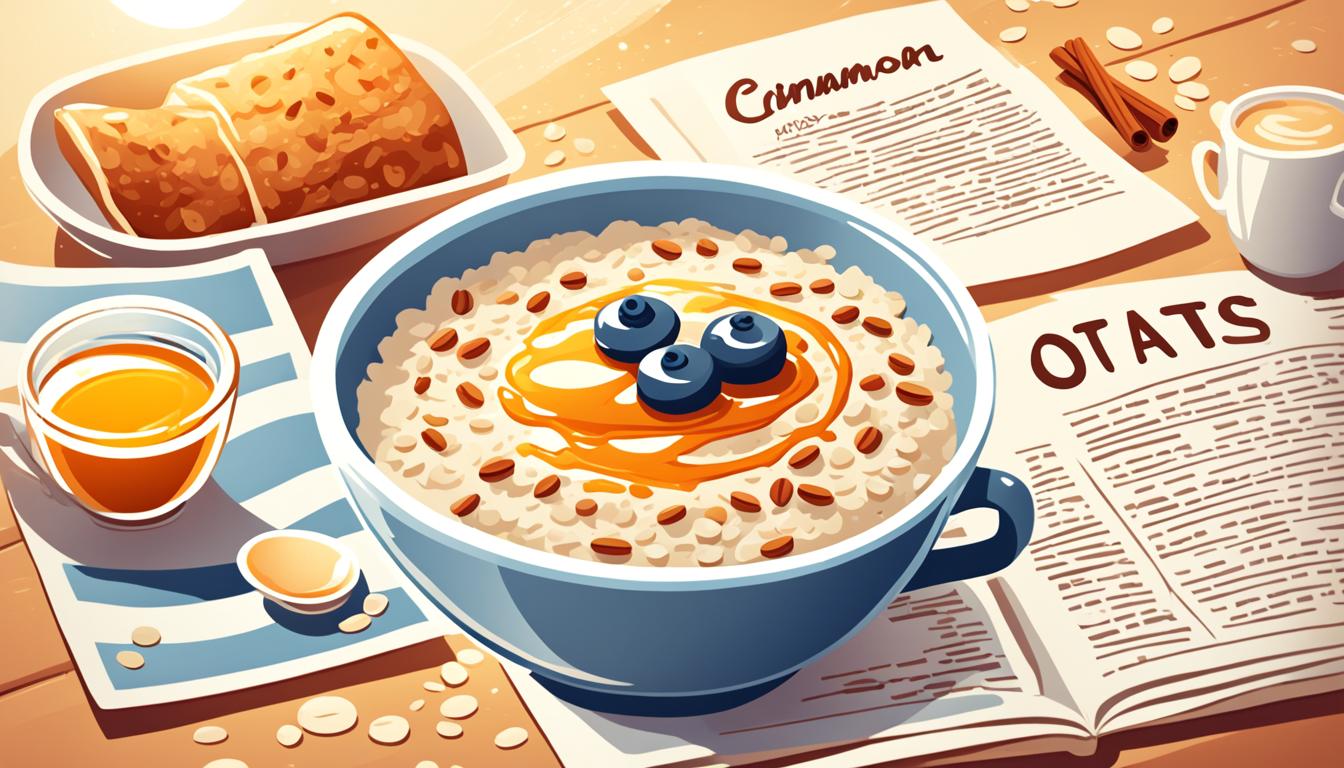
Chia Seeds: Tiny but Mighty
Chia seeds are small but big in fiber. They are rich in both soluble and insoluble fiber. They also give a good amount of plant-based protein. These little seeds turn into a jelly-like texture when mixed with liquid. This makes them great for overnight oats or chia pudding.
Two tablespoons of chia seeds bring lots of important nutrients. This includes fiber, protein, and good fats. They’re bursting with omega-3, magnesium, and calcium. With 6 grams of fiber in just one tablespoon, they are super for adding more fiber to food.
Chia seeds help with managing weight because of their fiber, protein, and fats. They make you feel full longer and help keep sugar levels steady. Plus, they help keep your heart healthy by lowering bad cholesterol and helping your heart’s rhythm.
You can use chia seeds in many dishes. They work well in salads, cereals, and baked goods. They can also thicken sauces. For baking, you can mix 3 tablespoons of water with whole chia seeds or ground chia seeds.
Chia seeds are a great kitchen helper, especially for adding more fiber and nutrients to your meals. Adding them to your breakfast or snacks is an easy way to get more good stuff into your diet.
Whole-Grain Cereals: Crunchy Fiber Fix
Whole-grain cereals are quick and easy to eat. They are packed with fiber. These breakfast foods are full of vitamins and minerals too, giving you a great start. They also make your morning crunchy and satisfying.
Fortified with Vitamins and Minerals
Whole-grain cereals have many essential vitamins and minerals added to them. This makes them even more nutritious. You get these important nutrients for your health in one bowl.
Textural Delight
The crunch in your bowl of whole-grain cereals makes breakfast more fun. The mix of crunchy grains and milk feels good in your mouth. It turns an ordinary meal into something special.
Watch for Added Sugars
Be careful, some cereals have a lot of sugar added. This extra sugar might cancel out their health benefits. Choose cereals that are low in sugar but high in fiber and whole grains. This way, you get the best nutrition without the bad stuff.
Berries: Sweet and Fiber-Filled
Strawberries, blueberries, raspberries – these tiny fruits are both sweet and full of fiber. A cup of strawberries gives you 3 grams of fiber and all the vitamin C you need in a day. Berries taste sweet, bring color to your plate, and boost it with antioxidants and vitamins.
Natural Sweetness and Color
Berries’ natural sweetness and bright colors are great for breakfast. Sprinkle them on oatmeal, mix into a smoothie, or eat them alone. It’s a fiber-filled, sweet way to start your day.
Antioxidants and Vitamins
Berries are fiber-rich and full of vitamins and antioxidants. Eating these nutrient-packed fruits supports your health and well-being. They’re a great addition to your breakfast for a nutritious start.
Supporting Digestive Health
Berries are great for your gut because they are high in fiber. Raspberries have 8 grams of fiber in a cup, and 6.5 grams for every 100 grams. They help keep your digestive system healthy and make you feel full. So, having berries for breakfast is a smart, nutritious choice.
Fiber-rich breakfasts your essential guide to staying full and energized
Starting your day with a fiber-rich breakfast is key. This type of carb in plant foods, fiber, keeps your gut healthy. It makes you feel full longer and helps manage your weight. Plus, it helps keep your energy steady in the morning.
Promoting Digestive Health
Fiber is key for a healthy gut. Foods like oatmeal, chia seeds, and whole grains are full of it. They help your digestion work smoothly.
Enhancing Satiety
Having a lot of fiber for breakfast keeps you full. This stops you from snacking a lot later. Things like berries and peanut butter keep you satisfied and full of energy.
Regulating Blood Sugar
Fiber also helps keep your blood sugar even. This means no sudden crashes in your energy. Oats, with their special fiber, can lessen your risk of heart disease.
Quick and Delicious Fiber-Packed Breakfast Ideas
Ready to change your breakfast game? Here are some fast, tasty, fiber-boosted morning meals. They’ll keep you feeling full and fired up all day.
Oatmeal with Fresh Berries
Warm up with a bowl of oatmeal, a great source of fiber. Add fresh berries on top for a sweet, high-fiber boost. This meal helps keep your heart healthy by lowering cholesterol.
Chia Seed Pudding
Chia seeds punch above their weight in fiber. Make a pudding with chia seeds, milk, sweetener, and flavor. Leave it in the fridge overnight. You’ll get a tasty, fiber-rich, plant-protein packed treat. This combo of soluble and insoluble fiber is great for you.
Whole-Grain Cereal Parfait
Whole-grain cereals are fast, fiber-filled, and packed with vitamins. Make a parfait with cereal, yogurt, and fresh berries. It’s a delicious, satisfying way to kickstart your morning with fiber.
Avocado Toast: A Creamy and Nutritious Start
Eating avocado on whole-grain toast is very fulfilling each morning. Avocados are full of healthy fats, water, and fiber. They keep you full and might stop you from eating too much during the day. This mix gives you a tasty, balanced breakfast with lots of B vitamins and minerals.
When you start your day with avocado toast, you get about 195 calories. It also has 11 grams of healthy fat and 8 grams of fiber. Avocado toast is not only tasty but also nutritious, helping you make healthier food choices throughout your day.
Avocado toast can be good for you if you’re trying to lose a few pounds. It might help keep your weight down and your waist size small. Plus, it’s a good source of fiber to keep you feeling full and help your digestion. It has many vitamins and minerals that your body needs. These include B vitamins, folate, vitamin K, and vitamin E. You also get magnesium, potassium, vitamin C, and special nutrients for your health.
But, remember to add protein to your avocado toast for a complete meal. And watch out for too much unhealthy fat from things like bacon or extra cheese. Also, think about the planet. Avocados that come from far away might not be so good for the environment.
Smoothies: A Refreshing Fiber Boost
Smoothies are a tasty way to get more fiber in your diet. They’re full of energy from nuts, cacao, and leafy greens. Plus, you get lots of important vitamins and antioxidants in one drink.
Green Smoothies
Green smoothies start your day right with spinach or kale. They’re also loaded with good stuff like chia seeds and coconut. Mixing fruits and vegetables makes them super nutritious and great tasting.
Berry Smoothies
Berry smoothies are a tasty and fiber-rich choice. The Berry, Chia, and Mint Smoothie has 105 calories and lots of nutrients. The Peach Blueberry Smoothie is another good option, with 170 calories and 8.5g of protein.
Nut Butter Smoothies
Nut butter smoothies are creamy and full of protein. The Coconut Matcha Shake is a great example, with 123 calories and 7g of protein. There’s no need for protein powder. You can get protein from things like Greek yogurt or nut butter.
Greek Yogurt: A Protein-Packed Partner
Greek yogurt is a great choice for a healthy breakfast that keeps you full. It has over 15 grams of protein in a serving. This makes it perfect for a morning meal that’s both tasty and wholesome. Also, it often has probiotics, which help keep your gut healthy.
Probiotics for Gut Health
Greek yogurt often has probiotics, which are live and active cultures. These friendly bacteria are key for a well-functioning digestive system. Using kefir, another dairy product full of probiotics, in breakfast dishes is a smart move for your gut.
Customizable Flavors
You can change the flavor of Greek yogurt to suit your taste. Add fruit for something sweet, or nuts for a more salty option. Try topping your yogurt with berries, honey, granola, or nut butter. This way, you’ll have a tasty, filling breakfast.
FAQ
Fiber-Rich Breakfasts FAQs
1. What makes breakfast a crucial meal for incorporating fiber?
Breakfast is the first meal of the day, providing an opportunity to kickstart your fiber intake and fuel your body for the day ahead. Including fiber-rich foods in your breakfast can help keep you full and energized for longer.
2. How can fiber-rich breakfasts contribute to overall health?
Fiber-rich breakfasts support digestive health, contribute to weight management by keeping you full, and help lower cholesterol levels, thus promoting overall health and well-being.
3. What are some key fiber-rich breakfast options?
Opt for high-fiber foods such as oats, whole grains, chia seeds, berries, and bananas to create nutrient-dense breakfasts that will provide you with sustained energy throughout the morning.
4. Can avocado be a part of a fiber-rich breakfast?
Yes, avocados are healthy fats and a good source of fiber. Adding avocado to your breakfast can enhance its nutritional value and contribute to a satisfying meal.
5. How does fiber help to keep you full and satisfied?
Fiber slows down digestion, promoting satiety and helping you feel full for longer periods. This can prevent overeating and support weight management goals.
6. What role do whole grains play in a fiber-rich breakfast?
Whole grains are rich in fiber and other essential nutrients. They provide a sustained release of energy, making them an excellent choice for breakfast to keep you feeling full and energized.
7. Are smoothies a good option for a fiber-rich breakfast?
Smoothies can be a convenient way to incorporate fiber-rich ingredients like fruits, vegetables, and chia seeds into your breakfast. Be sure to include sources of fiber to make your smoothie a balanced meal.
8. How can fiber-rich breakfasts help with boosting energy levels?
Fiber slows the release of glucose into the bloodstream, providing a steady source of energy. By choosing fiber-rich breakfast options, you can avoid energy crashes and maintain consistent energy levels.
9. Can fiber-rich breakfasts aid in weight management?
Yes, fiber-rich breakfasts aid in weight management by promoting satiety, stabilizing blood sugar levels, and supporting a healthy gut microbiome, which collectively help reduce calorie intake and regulate metabolism
Conclusion
A breakfast full of fiber is a great start to the day. Include oatmeal, chia seeds, and whole-grain cereals in your meals. Add berries and other fiber-rich foods too. These choices will keep you full and energized. They also help your digestion and keep your blood sugar steady. So, you’ll be ready for a productive and healthy day.
Starting your day with fiber is easy and powerful. You can eat oatmeal, chia seed pudding, or a cereal with fruit. These meals give your body the fiber, vitamins, and minerals it needs. Choosing a healthy breakfast will make you feel full. It’ll also help you stay energized and healthy over time.
Choose fiber-rich breakfasts to feel your best every day. Your body and mind will be grateful.

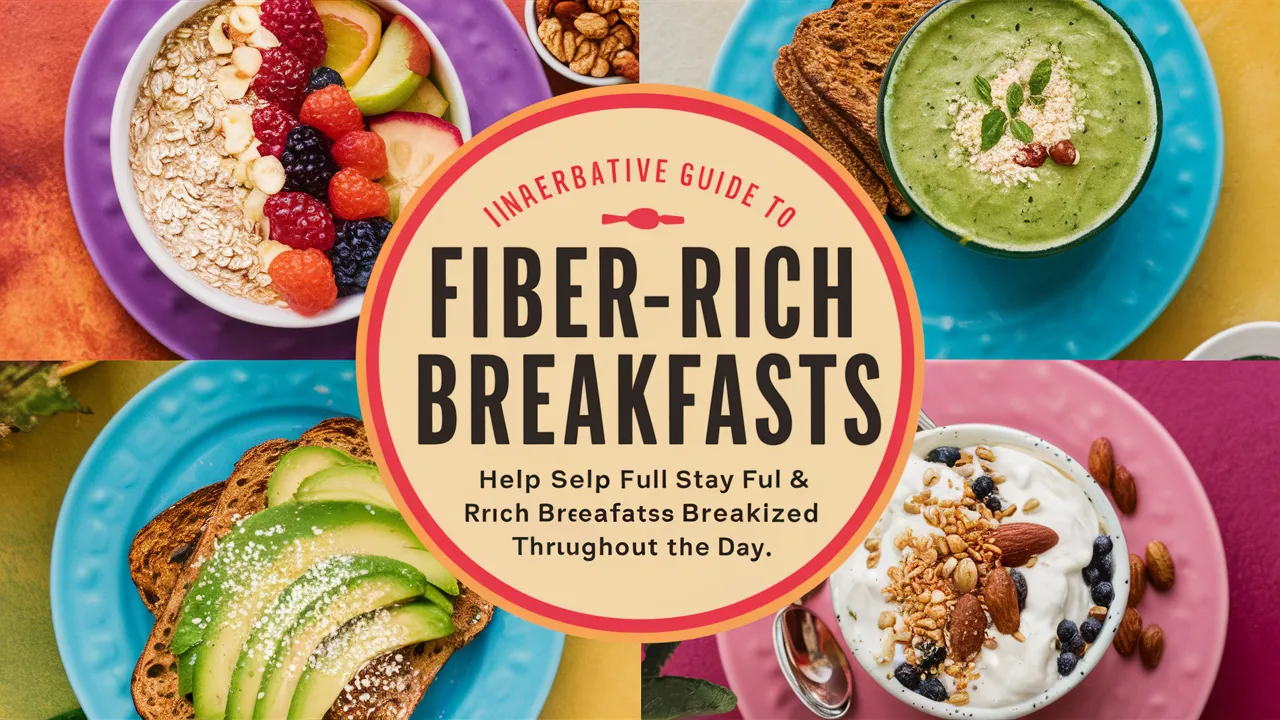
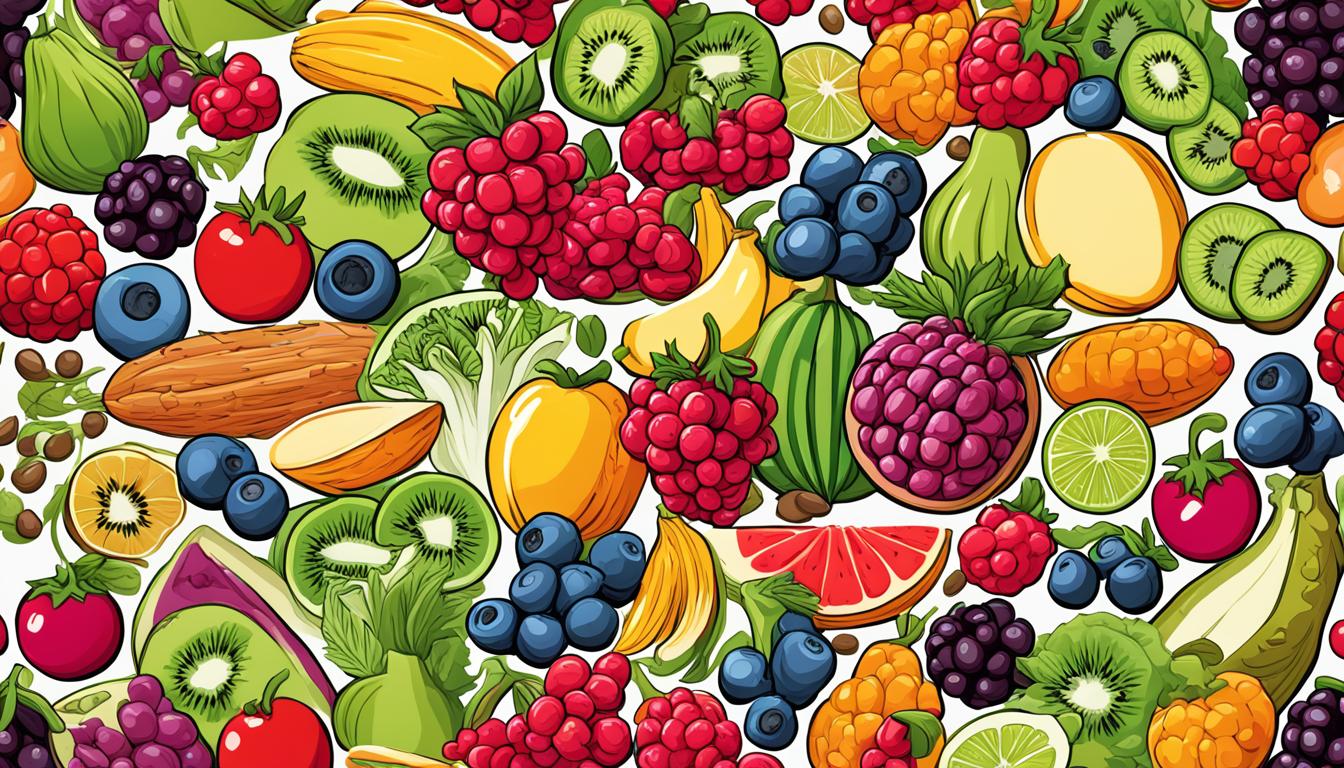
 powerful 7 red foods a double defense against (Heart)cardiovascular disease and cancer
powerful 7 red foods a double defense against (Heart)cardiovascular disease and cancer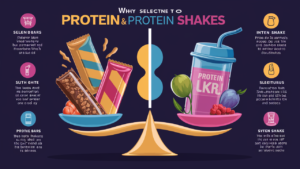 7 Compelling Reasons Why Choosing the Right Option - Protein Bars vs. Protein Shakes - Can Transform Your Lifestyle
7 Compelling Reasons Why Choosing the Right Option - Protein Bars vs. Protein Shakes - Can Transform Your Lifestyle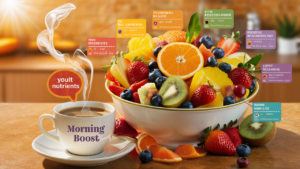



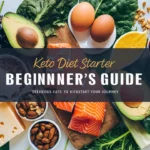
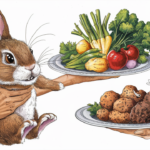
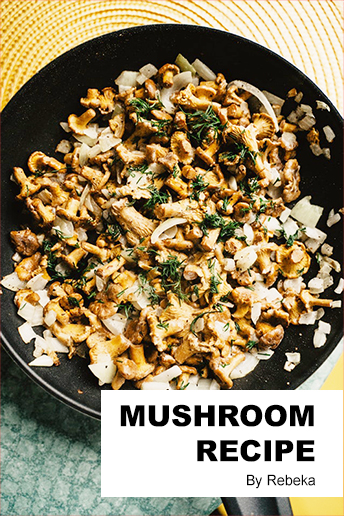

June 11, 2024 at 10:47 am[…] in terms of convenience depends on your lifestyle. If you’re on the go and need a quick protein boost, protein bars are a handy option. On the other hand, protein shakes can be easier to consume […]